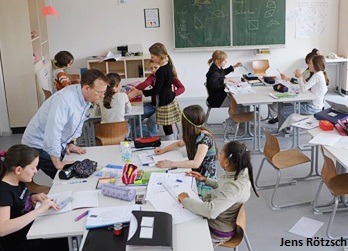 I had the opportunity recently to meet several science teachers at a conference to talk about evolution and climate change education. Most of them were avid supporters of the teaching of evolution, but when it came to climate change they were quite hesitant. When I started talking about this topic, they rebuffed the discussion, not because they didn’t accept the evidence of climate change, but rather because they didn’t see how it was relevant to their area of science.
I had the opportunity recently to meet several science teachers at a conference to talk about evolution and climate change education. Most of them were avid supporters of the teaching of evolution, but when it came to climate change they were quite hesitant. When I started talking about this topic, they rebuffed the discussion, not because they didn’t accept the evidence of climate change, but rather because they didn’t see how it was relevant to their area of science.“I’m a chemistry teacher,” one said, as if atmospheric and ocean chemical composition is completely unrelated to climate change.
Another ventured, “well, sometimes we do that eco-stuff,” as if climate change scientists were flighty “eco-hippies,” not PhD-trained researchers.
This presented a real challenge. When I told them that many different types of scientists studied climate change, from biologists and chemists to hydrologists and geologists, they looked at me skeptically. Sure, lady.
And herein lies the problem: since climate change is an inherently multi-disciplinary topic, it ends up getting shunted from subject to subject, never finding a comfortable home of its own in K–12 education. Chemistry teachers tell me that biology teachers should teach it; biology teachers tell me it belongs in earth sciences; and so on, until it is not taught at all. In the end, it is the students who suffer from this lack of knowledge.
In a 2011 study by the Yale Project on Climate Change Communication, researchers found that less than 60% of teens understood that global warming was due to human activities, and over 40% believed that stopping rockets from punching holes in the ozone layer was a way to mitigate it. This suggests that not only are students not learning the science of climate change, they are not connecting basic scientific concepts they are learning in their courses to this issue. This is where they need their teachers’ help to make these sometimes challenging connections.
The onus, though, is not just on teachers to figure out how to fit climate change science into their courses. Researchers need to inform them as to how climate change relates to their field. Biologists specializing in climate change need to reach out to biology teachers, atmospheric chemists to chemistry teachers, and so on. Educating the next generation of citizens is a joint endeavor, and teachers need the encouragement of researchers to understand what is new, relevant and cutting-edge.
Through greater collaboration between K–12 educators and researchers, there is an opportunity for teachers to educate students about the greatest and most interesting challenges of the 21st century. They need help, and scientists who study climate change (from hydrologists to microbiologists) are the ones who can provide it.

